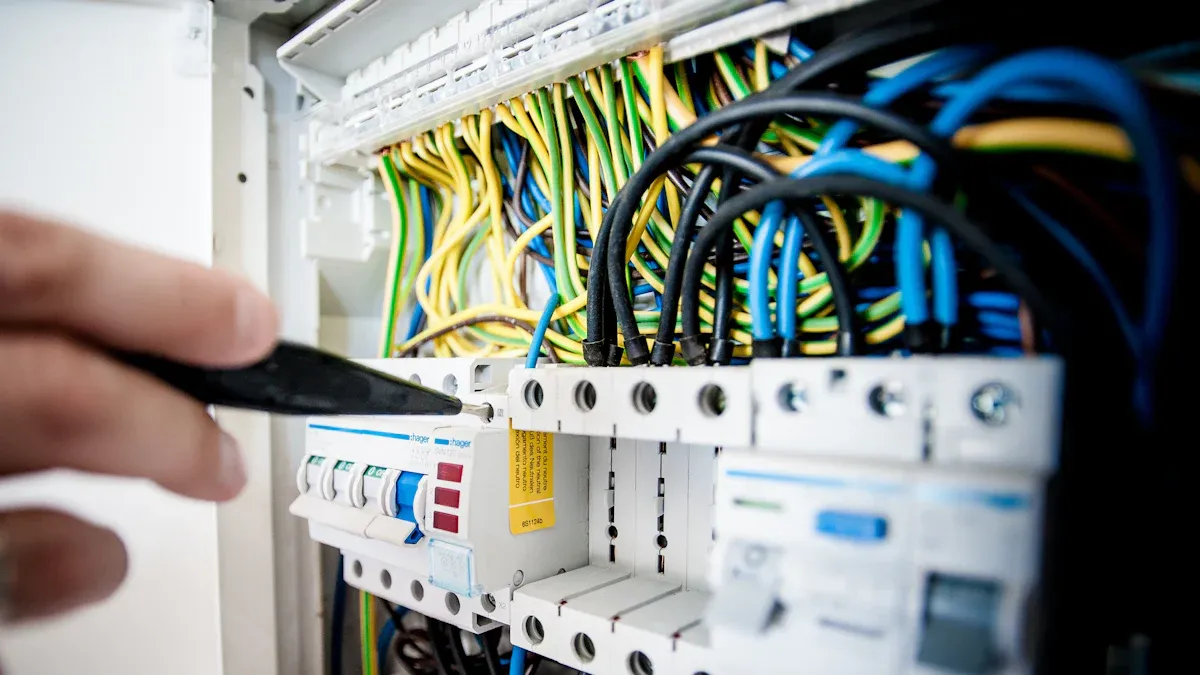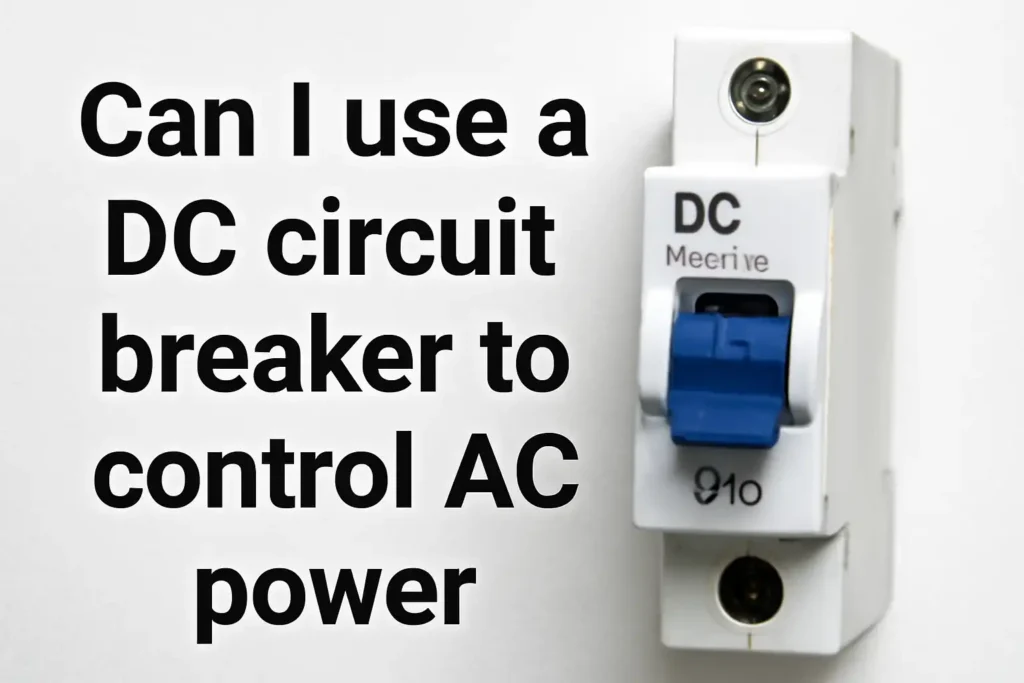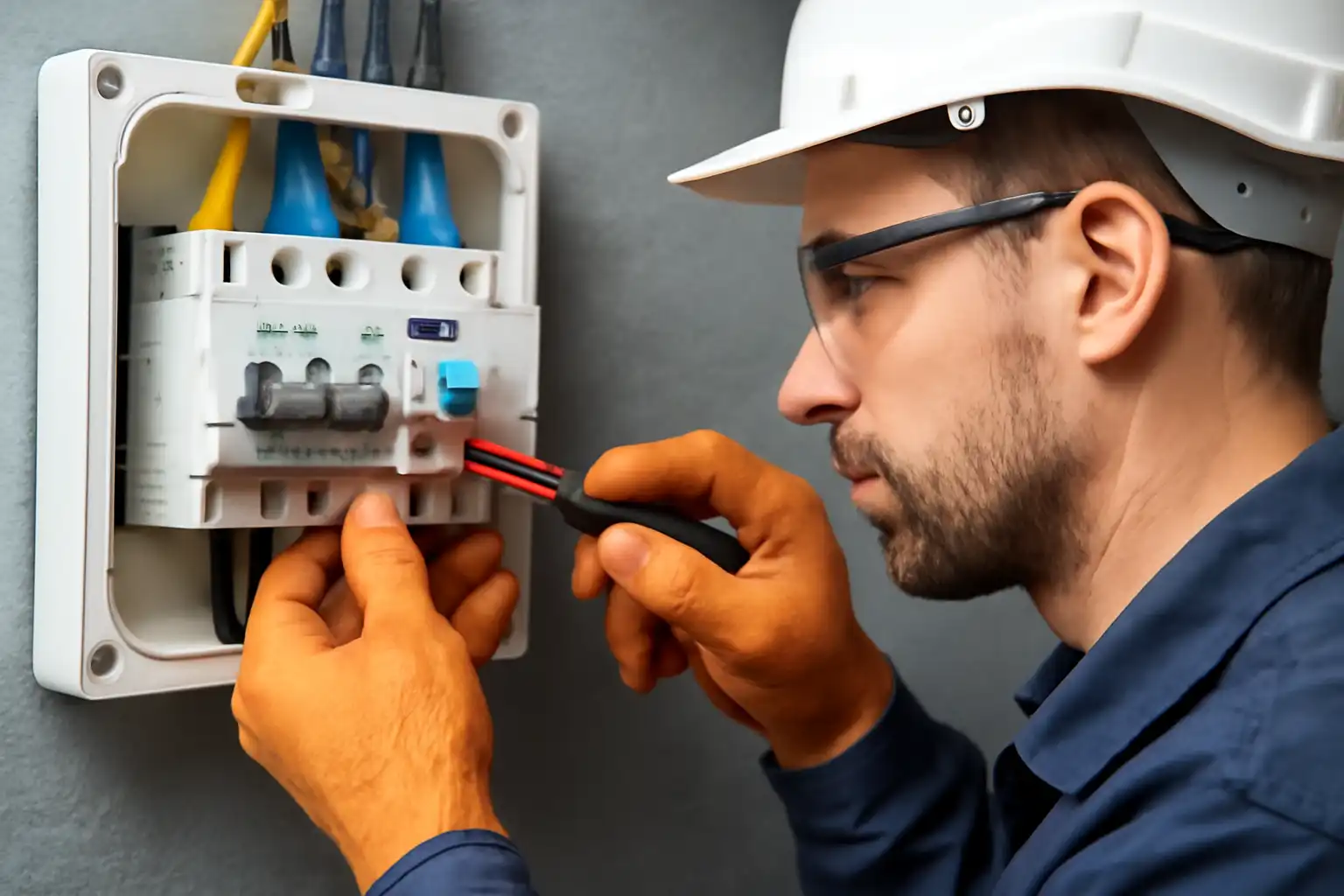You can’t use a DC circuit breaker for AC power. DC and AC work differently, and their breakers have special jobs. Using a DC breaker with AC might not handle the current. This could lead to overheating, broken equipment, or serious safety problems. Always use the right breaker for your system’s current to stay safe.
Key Takeaways
- Do not use a DC breaker for AC power. It may overheat or break.
- AC breakers are made to safely handle changing AC currents.
- Ask a trained electrician to help pick the right breaker.
- Following safety rules lowers danger and makes systems work better.
- The right breaker keeps your devices safe and your system running smoothly.
Technical Differences Between DC and AC Circuit Breakers
Differences between DC and AC currents
DC and AC currents work in different ways. DC, or direct current, flows in one steady direction. It doesn’t change over time. Batteries and solar panels use DC power. AC, or alternating current, switches direction many times each second. It works at 50 or 60 Hz, meaning it changes direction 50 or 60 times per second. AC is great for powering homes and businesses.
Here’s a simple comparison:
| Feature | AC (Alternating Current) | DC (Direct Current) |
|---|---|---|
| Direction of Current | Changes direction often | Flows in one direction |
| Frequency | 50 or 60 Hz | No frequency |
| Power Factor | Efficiency affected by phase differences | No phase issues |
| Applications | Good for motors and complex loads | Best for steady voltage control |
| Generation | Made by alternators | Comes from batteries or solar panels |
| Transmission | Works well over long distances | Used for special cases like HVDC |
AC currents have natural zero points where the current drops to zero. DC currents don’t have these zero points. This difference affects how circuit breakers are made.
How DC circuit breakers are designed
DC circuit breakers are made to handle direct current challenges. DC doesn’t have zero points, so stopping the flow is harder. When a DC breaker tries to stop the current, an arc forms. This arc must be stopped quickly to avoid damage.
DC breakers use special parts like arc chutes or magnetic coils. These parts stretch and cool the arc until it disappears. Some advanced DC breakers create fake zero points using circuits. This makes DC breakers more complex than AC ones.
Examples of DC circuit breakers:
| Type of DC Circuit Breaker | Design Features | Ratings |
|---|---|---|
| Solid-state DC Circuit Breaker | Uses IGCTs, GTOs, or IGBTs | Handles ≤ 1 kV, ≤ 1000 A |
| Hybrid DC Circuit Breaker | Combines fast action and low losses | Rated at 6.2 kV, 600 A |
| Magnetic DC Circuit Breaker | Uses small magnets | Activates when current is too high |
| Thermal DC Circuit Breaker | Uses heat-sensitive strips | Opens circuit when hot |
These designs help DC breakers safely stop high currents.
How AC circuit breakers are designed
AC circuit breakers use the zero points in AC currents. When the current hits zero, it’s easier to stop the flow. This creates smaller arcs, making AC breakers simpler to design.
AC breakers still face problems like arc erosion. This wears down the breaker’s parts over time. Engineers use better materials to reduce wear and make breakers last longer. Some AC breakers include features to improve reliability.
Key points about AC circuit breakers:
- Arc erosion affects how long they last. Engineers work to reduce this.
- Real-time monitoring helps check the breaker’s condition.
- Green designs make AC breakers more eco-friendly.
These features make AC breakers reliable and efficient for electrical systems.
Risks of Using a DC Circuit Breaker for AC Power

Overheating and equipment failure
Using a DC breaker for AC power can cause overheating. DC breakers aren’t made for the changing flow of AC currents. In an AC system, they struggle with the constant direction changes. This mismatch makes the breaker heat up too much.
Too much heat damages the breaker’s parts and connected equipment. Wires might melt, and insulation could wear out. These problems shorten your system’s life. You may need repairs or replacements often, which costs money.
To prevent these issues, use the right breaker for your system. AC breakers are designed for alternating currents. They keep your system safe and working well.
Inability to interrupt AC current
DC breakers can’t stop AC currents properly. AC currents have zero points where the flow stops briefly. AC breakers use these points to cut off electricity. DC currents flow steadily without zero points, so DC breakers can’t handle AC’s quick changes.
A DC breaker in an AC system won’t trip correctly. It might leave the circuit live, causing overloads or short circuits. Sometimes, it trips too late, damaging your devices.
To protect your system, use a breaker made for AC currents. AC breakers are built to safely stop alternating currents.
Safety hazards and fire risks
Using the wrong breaker creates big safety risks. A DC breaker in an AC system can cause electrical arcs. These arcs happen when the breaker can’t stop the current. Arcs make a lot of heat and can start fires.
Fire risks go up with overheated parts, damaged wires, and arcs. You could also get shocked if the breaker fails during a fault.
Follow safety rules to stay safe. Use the right breaker and ask an electrician if unsure. Choosing the correct breaker keeps your system safe and risk-free.
Alternatives to DC Circuit Breakers for AC Power
Using an AC circuit breaker
Always use an AC circuit breaker for AC power. AC breakers are made for alternating currents. They stop electricity safely at zero points. Zero points are moments when the current drops to zero. This helps prevent overheating, arcs, and damage.
AC breakers come in different types and sizes. Miniature circuit breakers (MCBs) work for small loads. Molded case circuit breakers (MCCBs) handle bigger systems. Picking the right breaker keeps your system safe and efficient. Using AC breakers protects equipment and lowers electrical risks.
Consulting a licensed electrician
Talk to a licensed electrician for electrical system advice. Electricians know how to choose the right breaker for your setup. They follow safety rules like the National Electrical Code (NEC). This ensures your system meets safety standards.
Benefits of hiring a licensed electrician:
- They pick breakers that meet NEC safety rules.
- They give advice for tricky electrical setups.
- They help install or upgrade panels for better safety.
Getting expert help avoids mistakes and keeps your system working well.
Following electrical safety codes
Follow safety codes to reduce risks and improve performance. These codes explain how to install and care for electrical systems. They make systems safer and lower accident chances.
| Improvement Type | Statistic |
|---|---|
| Fewer electrical incidents | 91% drop in two years |
| More training participation | 100% |
| More hazard reports | 45% increase |
| Lower workers’ compensation costs | Saved $450,000 |
| Lower TRIR | 78% drop in 18 months |
These numbers show why safety rules matter. Following codes creates safer systems and saves money. Always use the right tools and follow regulations for safety.
Using a DC circuit breaker for AC power is not safe. DC breakers can’t handle the changing flow of AC currents. This can cause overheating, broken equipment, or even fires. Always pick the right breaker for your system to stay safe. AC circuit breakers are made to safely control alternating currents. If you’re unsure, ask a licensed electrician for help. They can make sure your system follows safety rules. Using the correct tools keeps your equipment safe and your system working well.
Tip: Follow electrical safety codes to lower risks and improve performance.
FAQ
Why can’t you use a DC circuit breaker for AC power?
DC breakers aren’t made for how AC currents work. AC currents change direction often, but DC breakers can’t handle this. They may overheat, create sparks, or fail completely. Using them with AC power is unsafe and harms your equipment.
What happens if you use the wrong circuit breaker?
The wrong breaker can overheat or cause sparks and damage. It might also lead to fires or system breakdowns. Always pick a breaker that matches your system’s current type to stay safe.
How do you choose the right circuit breaker?
First, figure out if your system uses AC or DC power. Then, check how much power it needs to handle. For AC systems, use breakers like MCBs or MCCBs. If unsure, ask an electrician for advice. They’ll help you pick a safe and proper breaker.
Are AC circuit breakers more common than DC ones?
Yes, AC breakers are used more because most places run on AC power. DC breakers are mainly for special systems like solar panels or batteries. Each type is designed for the current it controls.
Can a licensed electrician help with breaker selection?
Yes, electricians know how to choose the right breaker for your system. They follow safety rules and help avoid mistakes. Hiring one ensures your setup is safe and works well.
Tip: If you’re unsure about your system, ask an expert. Safety is always important.
The following information may be of interest to you
Why DC and AC Circuit Breakers Are Not Interchangeable
What Makes AC Better Than DC for Homes
The difference between AC MCB and DC MCB
The difference between an AC combiner box and a DC combiner box




